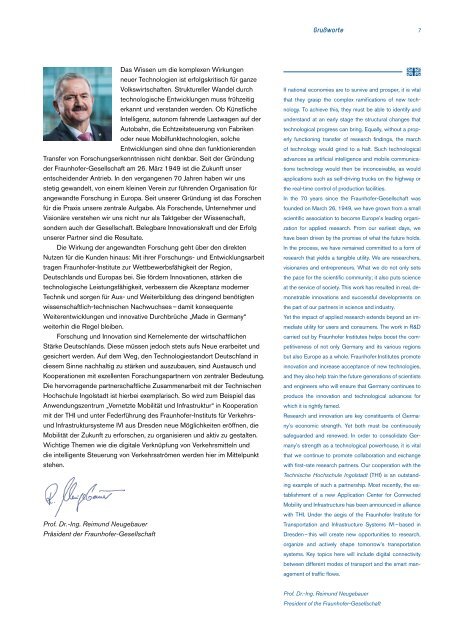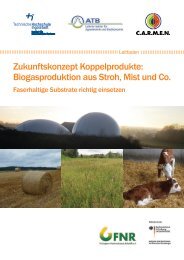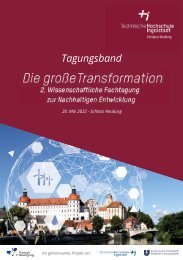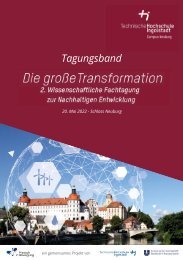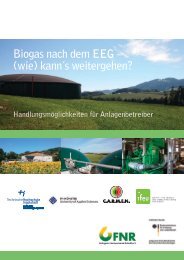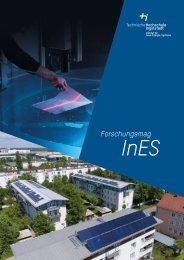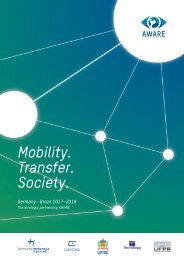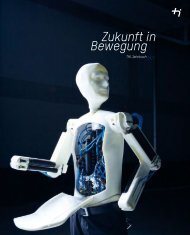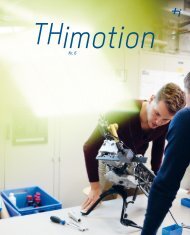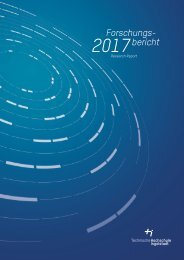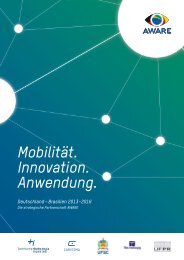Technische Hochschule Ingolstadt Forschungsbericht 2019
Sie wollen auch ein ePaper? Erhöhen Sie die Reichweite Ihrer Titel.
YUMPU macht aus Druck-PDFs automatisch weboptimierte ePaper, die Google liebt.
Grußworte<br />
7<br />
Das Wissen um die komplexen Wirkungen<br />
neuer Technologien ist erfolgskritisch für ganze<br />
Volkswirtschaften. Struktureller Wandel durch<br />
technologische Entwicklungen muss frühzeitig<br />
erkannt und verstanden werden. Ob Künstliche<br />
Intelligenz, autonom fahrende Lastwagen auf der<br />
Autobahn, die Echtzeitsteuerung von Fabriken<br />
oder neue Mobilfunktechnologien, solche<br />
Entwicklungen sind ohne den funktionierenden<br />
Transfer von Forschungserkenntnissen nicht denkbar. Seit der Gründung<br />
der Fraunhofer-Gesellschaft am 26. März 1949 ist die Zukunft unser<br />
entscheidender Antrieb. In den vergangenen 70 Jahren haben wir uns<br />
stetig gewandelt, von einem kleinen Verein zur führenden Organisation für<br />
angewandte Forschung in Europa. Seit unserer Gründung ist das Forschen<br />
für die Praxis unsere zentrale Aufgabe. Als Forschende, Unternehmer und<br />
Visionäre verstehen wir uns nicht nur als Taktgeber der Wissenschaft,<br />
sondern auch der Gesellschaft. Belegbare Innovationskraft und der Erfolg<br />
unserer Partner sind die Resultate.<br />
Die Wirkung der angewandten Forschung geht über den direkten<br />
Nutzen für die Kunden hinaus: Mit ihrer Forschungs- und Entwicklungsarbeit<br />
tragen Fraunhofer-Institute zur Wettbewerbsfähigkeit der Region,<br />
Deutschlands und Europas bei. Sie fördern Innovationen, stärken die<br />
technologische Leistungsfähigkeit, verbessern die Akzeptanz moderner<br />
Technik und sorgen für Aus- und Weiterbildung des dringend benötigten<br />
wissenschaftlich-technischen Nachwuchses – damit konsequente<br />
Weiterentwicklungen und innovative Durchbrüche „Made in Germany“<br />
weiterhin die Regel bleiben.<br />
Forschung und Innovation sind Kernelemente der wirtschaftlichen<br />
Stärke Deutschlands. Diese müssen jedoch stets aufs Neue erarbeitet und<br />
gesichert werden. Auf dem Weg, den Technologiestandort Deutschland in<br />
diesem Sinne nachhaltig zu stärken und auszubauen, sind Austausch und<br />
Kooperationen mit exzellenten Forschungspartnern von zentraler Bedeutung.<br />
Die hervorragende partnerschaftliche Zusammenarbeit mit der <strong>Technische</strong>n<br />
<strong>Hochschule</strong> <strong>Ingolstadt</strong> ist hierbei exemplarisch. So wird zum Beispiel das<br />
Anwendungszentrum „Vernetzte Mobilität und Infrastruktur“ in Kooperation<br />
mit der THI und unter Federführung des Fraunhofer-Instituts für Verkehrsund<br />
Infrastruktursysteme IVI aus Dresden neue Möglichkeiten eröffnen, die<br />
Mobilität der Zukunft zu erforschen, zu organisieren und aktiv zu gestalten.<br />
Wichtige Themen wie die digitale Verknüpfung von Verkehrsmitteln und<br />
die intelligente Steuerung von Verkehrsströmen werden hier im Mittelpunkt<br />
stehen.<br />
Prof. Dr.-Ing. Reimund Neugebauer<br />
Präsident der Fraunhofer-Gesellschaft<br />
If national economies are to survive and prosper, it is vital<br />
that they grasp the complex ramifications of new technology.<br />
To achieve this, they must be able to identify and<br />
understand at an early stage the structural changes that<br />
technological progress can bring. Equally, without a properly<br />
functioning transfer of research findings, the march<br />
of technology would grind to a halt. Such technological<br />
advances as artificial intelligence and mobile communications<br />
technology would then be inconceivable, as would<br />
applications such as self-driving trucks on the highway or<br />
the real-time control of production facilities.<br />
In the 70 years since the Fraunhofer-Gesellschaft was<br />
founded on March 26, 1949, we have grown from a small<br />
scientific association to become Europe’s leading organization<br />
for applied research. From our earliest days, we<br />
have been driven by the promise of what the future holds.<br />
In the process, we have remained committed to a form of<br />
research that yields a tangible utility. We are researchers,<br />
visionaries and entrepreneurs. What we do not only sets<br />
the pace for the scientific community; it also puts science<br />
at the service of society. This work has resulted in real, demonstrable<br />
innovations and successful developments on<br />
the part of our partners in science and industry.<br />
Yet the impact of applied research extends beyond an immediate<br />
utility for users and consumers. The work in R&D<br />
carried out by Fraunhofer Institutes helps boost the competitiveness<br />
of not only Germany and its various regions<br />
but also Europe as a whole. Fraunhofer Institutes promote<br />
innovation and increase acceptance of new technologies,<br />
and they also help train the future generations of scientists<br />
and engineers who will ensure that Germany continues to<br />
produce the innovation and technological advances for<br />
which it is rightly famed.<br />
Research and innovation are key constituents of Germany’s<br />
economic strength. Yet both must be continuously<br />
safeguarded and renewed. In order to consolidate Germany’s<br />
strength as a technological powerhouse, it is vital<br />
that we continue to promote collaboration and exchange<br />
with first-rate research partners. Our cooperation with the<br />
<strong>Technische</strong> <strong>Hochschule</strong> <strong>Ingolstadt</strong> (THI) is an outstanding<br />
example of such a partnership. Most recently, the establishment<br />
of a new Application Center for Connected<br />
Mobility and Infrastructure has been announced in alliance<br />
with THI. Under the aegis of the Fraunhofer Institute for<br />
Transportation and Infrastructure Systems IVI – based in<br />
Dresden – this will create new opportunities to research,<br />
organize and actively shape tomorrow’s transportation<br />
systems. Key topics here will include digital connectivity<br />
between different modes of transport and the smart management<br />
of traffic flows.<br />
Prof. Dr.-Ing. Reimund Neugebauer<br />
President of the Fraunhofer-Gesellschaft


